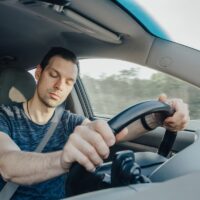The Dangers of Falling Asleep at the Wheel

Many people get behind the wheel of a car without first getting a full night’s sleep. Something may have kept them up all night, they may be on a schedule, or they may simply be in a hurry. In many ways, however, drowsy driving can be just as dangerous as driving while impaired by drugs or alcohol. Tens of thousands of car accidents happen every year because of drowsy driving, and hundreds, if not thousands, of people are killed in drowsy driving accidents. Below, we discuss the dangers of falling asleep behind the wheel and what to watch out for to ensure that you do not find yourself driving while dangerously sleepy. Reach out to a seasoned Martinsburg car accident lawyer if you’ve been hurt in a car crash in West Virginia.
Falling Asleep at the Wheel is Terrifyingly Common
Drowsy driving is a widespread problem, prevalent across the state and the country. According to federal safety officials, around 1 in 25 adult drivers admits to having fallen asleep at the wheel in the 30 days prior to being surveyed. Those are just the drivers who admitted to falling asleep while driving, and that only includes falling asleep in the previous 30 days, as opposed to at any time in the past.
The National Highway Traffic Safety Administration estimates that drowsy driving was directly responsible for 72,000 crashes, 44,000 injuries, and 800 deaths, just in the year 2013. Federal officials believe these numbers significantly underestimate the problem; researchers believe that as many as 6,000 fatal crashes every year are attributable to drowsy driving.
Driving Drowsy is Like Driving Drunk
Even drivers who do not fully fall asleep at the wheel pose a danger to everyone on the road if they are driving without sufficient sleep. Driving while sleepy makes drivers less able to pay attention to the road, slower to react to any unexpected events or hazard, and less able to make good decisions when an unexpected hazard does arrive.
According to health and safety studies, drowsiness can impair drivers just as much as drugs or alcohol. Driving without having slept for 18 hours is the equivalent of driving with a blood alcohol concentration (BAC) of 0.05%. Drivers who go a full 24 hours without sleep and get behind the wheel suffer impairment equal to driving with a BAC of 0.10%, which is 0.02% over the legal limit. Drowsy driving can cause a variety of impairments, including:
- Blurry or fuzzy vision
- Forgetfulness
- Difficulty focusing
- Lack of good judgment and decision-making capabilities
- Slower reaction times
- Confusion and disorientation
- Falling asleep at the wheel
Any one of these impairments significantly increases the likelihood of a serious accident.
The Warning Signs of Drowsy Driving
If you are driving on limited sleep, there are a number of symptoms to watch out for. You may be too drowsy to drive safely if you find yourself, for example:
- Blinking frequently
- Feeling droopy-eyed
- Yawning frequently
- Hitting the rumble strips on the side of the road
- Missing your exit or turn
- Forgetting the last few miles
- Drifting between lanes
- A feeling of dozing off
- Swerving
- Trouble maintaining the proper speed
- Following other cars too closely
What to Do if You Are Feeling Drowsy
If you find yourself experiencing any of these symptoms, you might be too tired to drive. If you can delay your trip, do so. If you need to get to your destination, there are a few ways to help wake yourself up:
- Pull over (safely) and take a rest. Get out of the car and do some jumping jacks or stretches. If you have the time, try to get a 20-minute power nap.
- Take regular breaks throughout a long trip.
- Drink cold water or juice. Caffeine can also help, at least for a few hours, although it is a poor long-term solution for a long drive.
- Switch drivers, if you are not driving alone.
- Eat healthy–fruits, vegetables, nuts. Heavy products like fast food will slow you down, but healthy foods will help perk you up.
- Sit up straight. Slouching leads to more drowsiness, while good posture gives you more control over the vehicle and encourages more alertness.
- Don’t drink alcohol, and avoid medications that cause drowsiness.
HELP WITH YOUR MARTINSBURG DROWSY DRIVER INJURY CLAIM
If you or someone you care about has been hurt by a drowsy or sleepy driver in West Virginia, call the passionate and dedicated Martinsburg personal injury attorneys Burke, Schultz, Harman & Jenkinson at 304-263-0900 or (304) LAWYERS for a free consultation.





